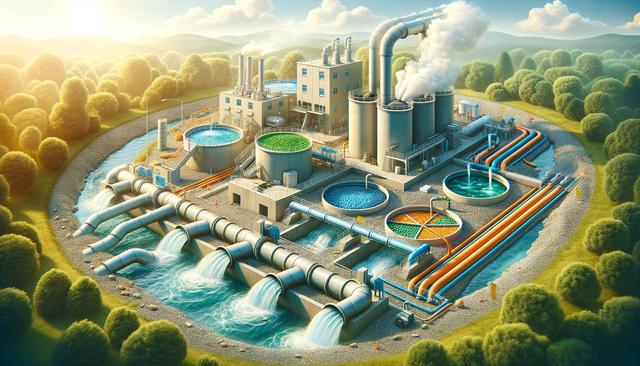The Role of Wastewater System Services in Modern Infrastructure
Wastewater system services are a critical component of urban and rural infrastructure. These systems are responsible for collecting, treating, and safely releasing or reusing water that has been contaminated by residential, commercial, or industrial use. As cities grow and environmental standards evolve, the need for reliable and efficient wastewater services becomes even more pressing. Properly managed wastewater systems protect public health, preserve natural ecosystems, and support sustainable development. Without professional oversight and maintenance, these systems can fail—leading to costly damage, health hazards, and environmental degradation.
Modern wastewater services involve more than just treatment plants. They include a wide range of operations that inspect, repair, and upgrade sewage lines, pumping stations, and treatment facilities. These services ensure compliance with environmental regulations and help municipalities avoid penalties. More importantly, they contribute to the long-term durability of local water infrastructure, keeping communities safe and water systems functioning efficiently.
Why Wastewater Operators Are Essential Now
The importance of wastewater operators has significantly increased in recent years. These professionals play a pivotal role in monitoring and maintaining complex water treatment systems. As regulations become more stringent and climate change introduces new challenges such as flooding and drought, the expertise of operators helps communities adapt and respond effectively.
Key responsibilities of wastewater operators include:
- Regular inspection and testing of water quality
- Maintenance of mechanical and electronic equipment
- Responding to system failures and emergency repairs
- Ensuring compliance with local and federal regulations
In addition to technical skills, operators bring valuable insight into system vulnerabilities and infrastructure planning. Their hands-on experience is vital to preventing service disruptions and avoiding costly consequences. With aging infrastructure in many regions, the demand for skilled wastewater operators is only expected to grow.
Preventing Costly Plumbing Issues Through Proactive Maintenance
One of the most effective ways to minimize plumbing-related expenses is through proactive maintenance of wastewater systems. When minor issues go unnoticed or unresolved, they can escalate into major problems that require extensive repairs, service interruptions, and expensive restoration efforts. Wastewater service providers play a key role in identifying these issues early and implementing solutions before they become more severe.
Proactive maintenance can include:
- Routine cleaning of sewer lines to prevent blockages
- Video inspections to detect cracks or root intrusions
- Flow monitoring to detect irregularities in system performance
- Grease trap and lift station servicing
These services not only extend the lifespan of the system but also reduce the risk of emergency incidents that can disrupt daily life and business operations. Investing in regular maintenance is a smart strategy for property owners, municipalities, and facility managers alike.
Environmental and Public Health Benefits
The benefits of wastewater system services extend beyond infrastructure maintenance—they have a direct impact on environmental protection and public health. Untreated or poorly treated wastewater can contaminate groundwater, rivers, and coastal areas, posing significant health risks and harming local ecosystems. Reliable wastewater treatment reduces these risks by effectively removing harmful contaminants and pathogens before water is released back into the environment.
Some of the key public health benefits include:
- Reducing waterborne illnesses by eliminating bacteria and viruses
- Maintaining clean recreational water bodies
- Preventing contamination of drinking water sources
By supporting sustainable water management, wastewater services also contribute to climate resilience. Treated wastewater can be reused for irrigation, industrial processes, or even recharge of groundwater supplies—easing pressure on fresh water sources and promoting conservation efforts.
Choosing a Reliable Wastewater System Service Provider
When it comes to maintaining wastewater infrastructure, choosing the right service provider can make a significant difference. A dependable partner brings not only technical expertise but also a commitment to long-term system health and regulatory compliance. Look for providers with a proven track record, certified staff, and transparent communication practices.
Key qualities to consider include:
- Experience with a wide range of wastewater systems
- Availability of emergency services
- Use of modern diagnostic and repair technologies
- Strong reputation within the local community
A well-regarded wastewater service provider can help prevent disruptions, reduce long-term costs, and ensure that your system remains in peak condition. Their role is not just reactive—they are proactive partners in public health, environmental stewardship, and infrastructure sustainability.
Conclusion: The Ongoing Value of Wastewater System Services
As communities grow and environmental challenges become more complex, the role of wastewater system services continues to expand in importance. From protecting public health to preventing infrastructure failures, these services offer essential benefits that cannot be overlooked. Whether you manage a residential property, a commercial facility, or a municipal utility, partnering with a reliable wastewater service provider is a strategic investment. Their work ensures the smooth operation of critical infrastructure and promotes long-term sustainability for both people and the planet.




Leave a Reply